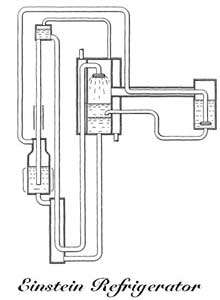September 25, 2008 weblog
Einstein's green refrigerator making a comeback

While almost everybody knows how Einstein revolutionized physics with his theories of relativity, many people may not know that the great scientist had a domestic side, too. Well, sort of - in 1930, Einstein and his former student Leo Szilard designed a refrigerator that required no electricity and had no moving parts. However, as refrigerator technology became more efficient, Einstein's design was nearly forgotten.
Now, Malcolm McCulloch, an electrical engineer at Oxford, is trying to bring Einstein's refrigerator back. McCulloch explains that the design is environmentally friendly and could prove especially useful in developing countries, where demand for cooling appliances is quickly increasing.
McCulloch's team has recently built a prototype of Einstein and Szilard's refrigerator. Instead of compressing man-made greenhouse gases called freons, as typical refrigerators do, the prototype uses pressurized gas to keep items cold. The refrigerator just requires a way to heat the liquids, and McCulloch has been working on developing a solar energy system to meet this requirement.
The refrigerator is based on the idea that liquids boil at low temperatures when the surrounding air pressure is low.
"If you go to the top of Mount Everest, water boils at a much lower temperature than it does when you´re at sea level, and that´s because the pressure is much lower up there," McCulloch said.
In their refrigerator prototype, the scientists filled a flask with liquid butane (which is also commonly sold as a liquid in cigarette lighters and as a gas for cooking). Then the scientists introduced a new vapor to decrease the air pressure, which decreases the liquid boiling temperature, causing the butane to boil. As the butane boils, it takes energy from the surroundings, and lowers the temperature inside the refrigerator.
Although Einstein and Szilard´s original design was not as efficient as the freon refrigerators that replaced them, McCulloch plans to improve the design by using different kinds of gases. He predicts these improvements could quadruple the refrigerator´s efficiency.
The fact that the refrigerator has no moving parts could also be advantageous, he explains, as it would require minimal maintenance and so could be particularly useful in rural areas.
McCulloch emphasizes that the refrigerator is still just a prototype, but he hopes to one day commercialize it. The work is part of his team's three-year project to develop robust appliances that can be used in locations without electricity.
via: The Guardian





















